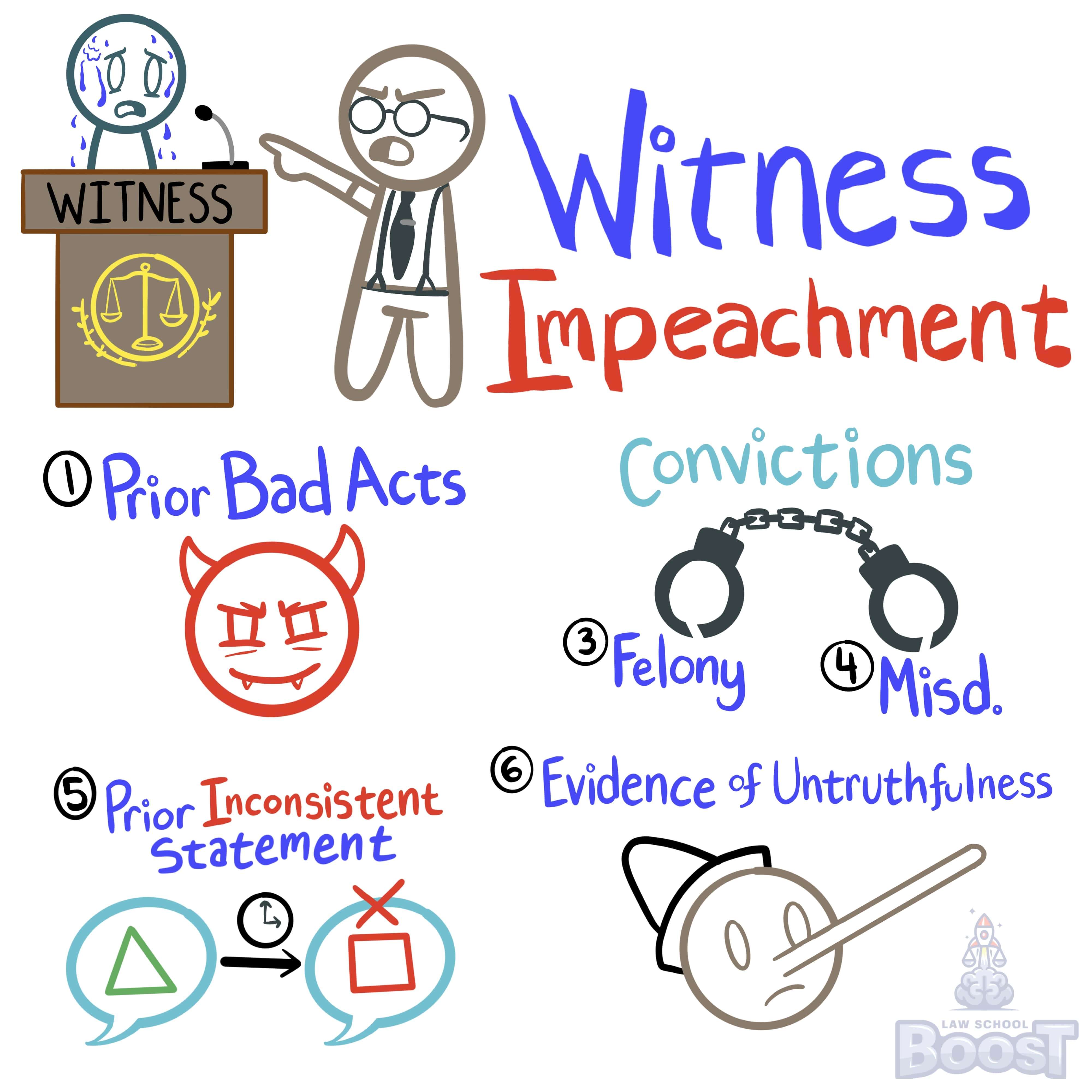🦅
Federal Evidence • Witness Impeachment
EVID#088
Legal Definition
There are 5 primary ways to impeach a witness: (1) specific instances of conduct and prior bad acts; (2) felony convictions; (3) misdemeanor convictions involving dishonesty or false statements; (4) prior inconsistent statements; and (5) evidence of character for untruthfulness.
Plain English Explanation
A witness's truthfulness can be challenged in court in five main ways: (1) bringing up their past wrongdoings or misbehavior; (2) using their serious crime records; (3) mentioning their less serious criminal record if it involves lying; (4) highlighting times they said something different than what they're saying now; and (5) presenting proof that they tend to be dishonest.
Hypothetical
Hypo 1: Bob is on trial for theft. During the trial, Sam, a witness, testifies that he saw Bob stealing. The defense brings up an instance from Sam's past where he lied to the police about a similar incident. Result: This challenges Sam's credibility and suggests he might not be telling the truth now, based on his past conduct of lying in a similar situation.
Hypo 2: In a lawsuit, Sam testifies that Bob caused a car accident. Bob's lawyer presents court records showing Sam was convicted of a felony five years ago. Result: This information is used to suggest that Sam might not be a reliable witness due to his felony conviction.
Hypo 3: Bob sues Sam for breach of contract. During the trial, Bob presents an email from Sam that contradicts Sam's current testimony. Result: This prior inconsistent statement by Sam is used to question his honesty and the accuracy of his current testimony.
Hypo 4: In a property dispute, Sam testifies that he witnessed Bob damaging his property. Bob's attorney shows evidence that Sam is known in the community for being dishonest. Result: This character evidence is used to suggest that Sam's testimony may not be trustworthy due to his reputation for dishonesty.
Hypo 5: Bob is on trial, and Sam, a witness, testifies that he heard Bob planning the crime. Bob's lawyer argues that Sam once stole a candy bar as a child. Result: This trivial past act of Sam is not relevant or serious enough to impact his credibility as a witness in the current case.
Hypo 2: In a lawsuit, Sam testifies that Bob caused a car accident. Bob's lawyer presents court records showing Sam was convicted of a felony five years ago. Result: This information is used to suggest that Sam might not be a reliable witness due to his felony conviction.
Hypo 3: Bob sues Sam for breach of contract. During the trial, Bob presents an email from Sam that contradicts Sam's current testimony. Result: This prior inconsistent statement by Sam is used to question his honesty and the accuracy of his current testimony.
Hypo 4: In a property dispute, Sam testifies that he witnessed Bob damaging his property. Bob's attorney shows evidence that Sam is known in the community for being dishonest. Result: This character evidence is used to suggest that Sam's testimony may not be trustworthy due to his reputation for dishonesty.
Hypo 5: Bob is on trial, and Sam, a witness, testifies that he heard Bob planning the crime. Bob's lawyer argues that Sam once stole a candy bar as a child. Result: This trivial past act of Sam is not relevant or serious enough to impact his credibility as a witness in the current case.
Visual Aids

Related Concepts
In California, how may a witness be impeached?
When attempting to impeach a witness, how do courts handle the admissibility of evidence related to evidence of character for untruthfulness?
When attempting to impeach a witness, how do courts handle the admissibility of evidence related to felony convictions?
When attempting to impeach a witness, how do courts handle the admissibility of evidence related to misdemeanor convictions?
When attempting to impeach a witness, how do courts handle the admissibility of evidence related to prior inconsistent statements?
When attempting to impeach a witness, how do courts handle the admissibility of evidence related to specific instances of conduct and prior bad acts?
When attempting to impeach a witness in California, how do courts handle the admissibility of evidence related to felony convictions?
When attempting to impeach a witness in California, how do courts handle the admissibility of evidence related to misdemeanor convictions?
When attempting to impeach a witness in California, how do courts handle the admissibility of evidence related to prior inconsistent statements?
When attempting to impeach a witness in California, how do courts handle the admissibility of evidence related to specific instances of conduct and prior bad acts?
When attempting to impeach a witness in California, how do courts handle the admissibility of evidence under Proposition 8?


